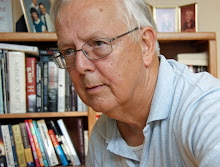 Meet Bun Yom,
author of the chilling memoir Tomorrow I’m Dead.
The world must never forget the horrors the Khmer Rouge inflicted on the people
of Cambodia, which is why his brief, gripping personal account is so important.
The communist army drove everyone out of cities and villages and sent them into
the countryside. Over a million souls were murdered for showing the smallest
sign of education or wealth, often for no reason at all. Colored clothing was
considered a sign of wealth, so all workers wore white. No one was allowed to
find food on his own:
Meet Bun Yom,
author of the chilling memoir Tomorrow I’m Dead.
The world must never forget the horrors the Khmer Rouge inflicted on the people
of Cambodia, which is why his brief, gripping personal account is so important.
The communist army drove everyone out of cities and villages and sent them into
the countryside. Over a million souls were murdered for showing the smallest
sign of education or wealth, often for no reason at all. Colored clothing was
considered a sign of wealth, so all workers wore white. No one was allowed to
find food on his own:
One
boy said, “I am hungry. I ate a snake.”
The
Khmer Rouge asked, “Where’d you get the snake?”
The
kids told them where it was. The Khmer Rouge took those two kids away from our
group.
The
next morning, after I had worked for a while, I asked the Khmer Rouge if I
could go pee—I wanted to eat some more meat. When I ran down there, I saw the
snake was gone, but the two kids’ bodies were there, with their throats cut. I
ran back to work and told my crew what I had seen. After that, I kept thinking,
How can I get food?
Bun Yom not only survived the four-year catastrophe
(1975-1979). After reaching a Thai refugee camp, he repeatedly led “Cambodian
Freedom Army” forces of up to 300 men back
into Cambodia to rescue people still trapped there as recently as 1983. He was
more interested in getting Khmer Rouge to surrender than he was in killing
them:
We
took their green uniforms, put them in a pile, and burned them in front of
their faces. We gave them good food and new clothes.
…You
are with the Freedom Army now. You cannot fight. No more bullets and guns. No
more green uniforms.
Eventually Bun Yom came with his parents and brother to
Ellensburg, Washington, sponsored by the local First United Methodist church.
Since then he worked as a Kittitas County groundskeeper for 16 years, started a
Thai restaurant with his wife, then borrowed money and went into business as a
mechanic. Meanwhile, he had a powerful story to tell.
He first wrote it in Khmer, the Cambodian language, then
arranged for it to be translated into English. In a phone interview, he said he
sold 1,000 copies—his entire print run—in three hours at his restaurant. Since
then he’s had book signings in several locations around the US.
Tomorrow I’m Dead deserves a wide audience, and I encourage you to buy it. You can purchase the book through http://www.bunyom.com. Note that it's also available in Kindle and Nook versions.
Bun
Yom in his own words
I was born in Pailin, Cambodia
in 1960. I attended the local schools and, because I was doing so well, I
was allowed to skip several grades. As a result, I went to college early,
at age 13. I was in the second year of college when the Khmer Rouge took
over.
I lived with my mother and
father, my sister and three brothers. My father and mother ran a
restaurant and grocery store. They also found and sold rubies. I
also worked on my uncle's farm.
I was 14 years old when the
Khmer Rouge came. They immediately oredered people out of their homes and
into the jungle. Because I was young and strong, I was taken as a slave
laborer. For 2 1/2 years, I worked at various tasks--building dams,
working in rice fields, etc.--with only one cup of rice soup per day. Of
course, I supplemented that meager diet with whatever I and others could find
in the jungle--snakes, rats, grasshoppers, fish, shrimp. etc.--of course,
uncooked. My legs became thinner than a normal person"s arms.
But, if anyone faltered and was unable to work, they were immediately
killed. That happened to many of my acquaintances.
Eventually, I was rescued by
the Cambodian Freedom Army. I joined them, was trained and became a
leader in rescuing other Cambodians from the clutches of the Khmer Rouge.
I helped lead the Freedom Army for five years, then I learned that my
family was alive and in a refugee camp in Thailand. So, I left the Freedom Army
and joined my father and mother and a brother in the refugee camp. We
were later transferred to a camp in the Philippines, and from there we came to
the United States, sponsored by the United Methodist Church of Ellensburg,
Washington.
I worked for a time on a farm
near Ellensburg, as well as a food processing plant and a restaurant as a
janitor. Then, I got a job as a groundskeeper at the Kittitas County
Fairgrounds. My wife and I opened a restaurant, which I subsequently sold
and invested in a garage to repair cars. I had taught myself how to
repair cars. Then the Great Recession hit and I was not able to get
enough business to pay the mortgage on the garage. It was then I focused
on writing and publishing my book.
I currently live with my wife,
Aun To, and my son, Daniel. We also have two grown daughters, Louy and
Nung. We have two grandchildren, one 4 years old, the other four months.










